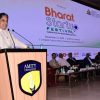India must reclaim its prominence in scientific innovation: Narayana Murthy
Infosys founder N.R. Narayana Murthy on Thursday emphasized the need for India to reclaim its historical prominence in scientific innovation during a virtual address at the announcement ceremony for the 2024 Infosys Science Prizes.
“In Israel, a land lacking in natural resources, we learned to appreciate our greatest national advantage: our minds. Through creativity and innovation, we transformed barren deserts into flourishing fields and pioneered new frontiers in science and technology,” Murthy quoted the late Shimon Peres from Israel, adding that such is the power of groundbreaking ideas for every nation.
Drawing parallels with Israel’s technological achievements, Murthy stated, “History tells us that India was a leading nation leveraging the power of ideas in mathematics, astronomy, engineering, medicine, and surgery from the Vedic times until the multiple invasions of our country by tribal leaders from Afghanistan and Uzbekistan during the period 700 AD to 1520 AD, followed by the later arrival of British colonists.”
He said that rulers from Afghanistan and Uzbekistan did not have much appreciation for science, medicine, and mathematics, while British colonizers only sporadically encouraged Indians to pursue ambitious and imaginative work.
“But our progress was slow. Thus, Indian youth were held back in their pursuits of these areas, including observation of nature, curiosity, inferencing, critical and analytical thinking, invention and innovation, and problem definition and problem-solving between 1000 AD and 1947 AD — a period of about a thousand years,” Murthy said.
He noted that the drive to revive the power of science, technology, engineering, and mathematics (STEM) to solve the nation’s problems began after independence, though the task remains a significant challenge. Murthy explained that global academic history shows that good governance, academic freedom, meritocracy, encouragement, respect, admiration, and sufficient government funding are essential for restoring India’s former glory.
“At the same time, history also teaches us that successful countries develop a mindset of high aspiration, global benchmarking, and open-mindedness to learn how top-quality global research and higher educational institutions are governed in countries that have produced groundbreaking ideas from research efforts. Singapore is a good example of such success. We may want to study the case of Singapore,” he added.
Source: TOI
Also read: Narayana Murthy suggests allocating $1 billion annually for teacher training

















Add comment